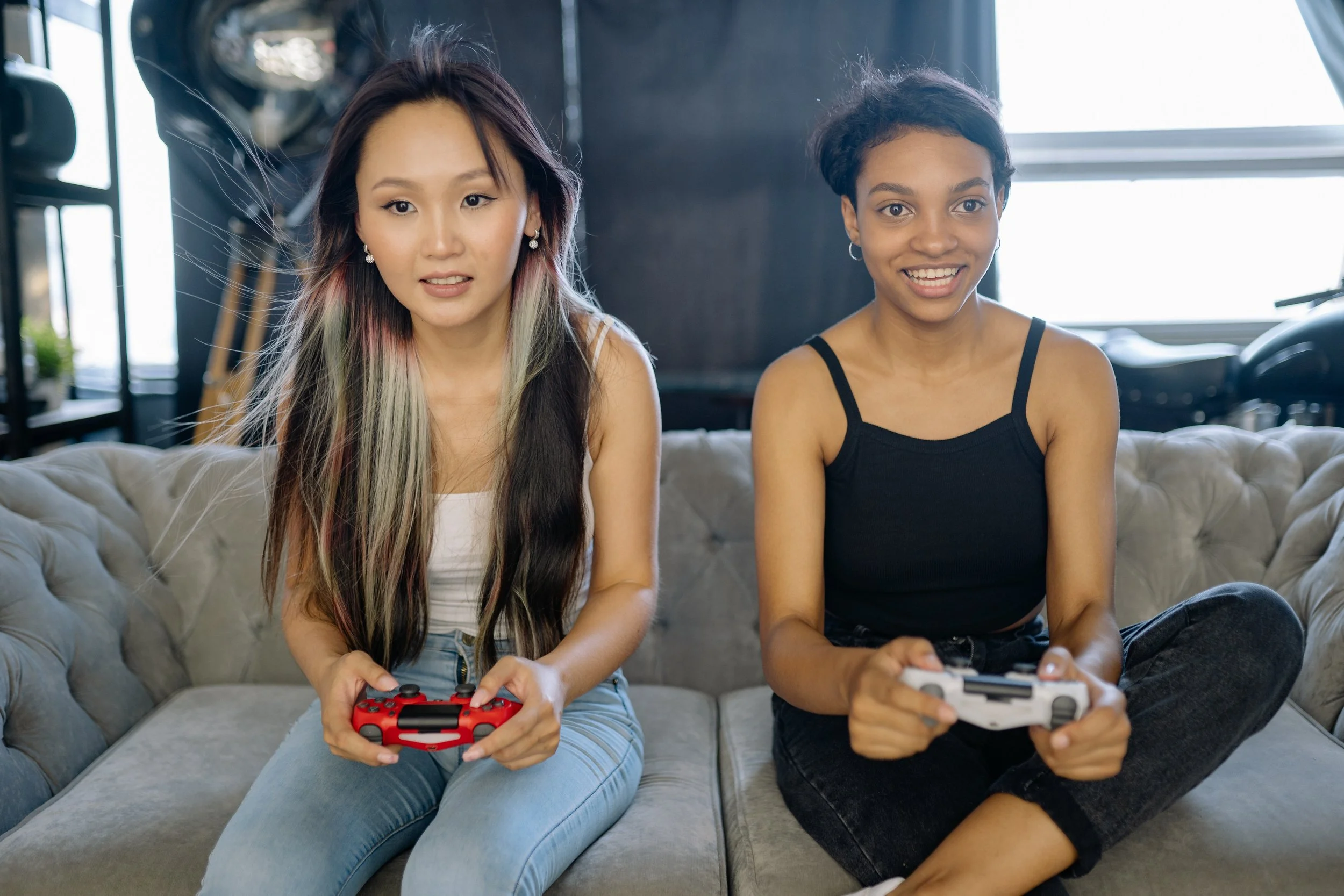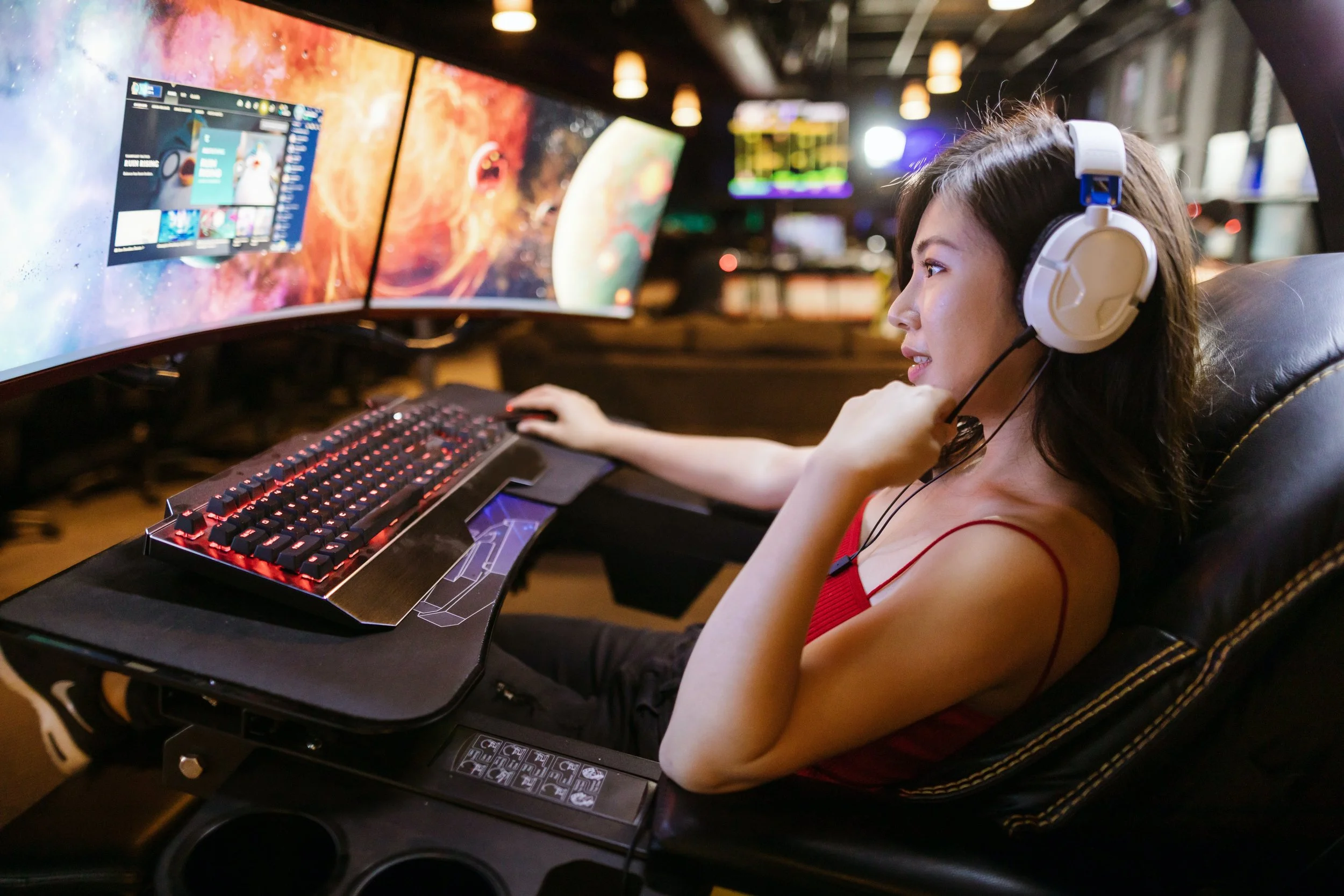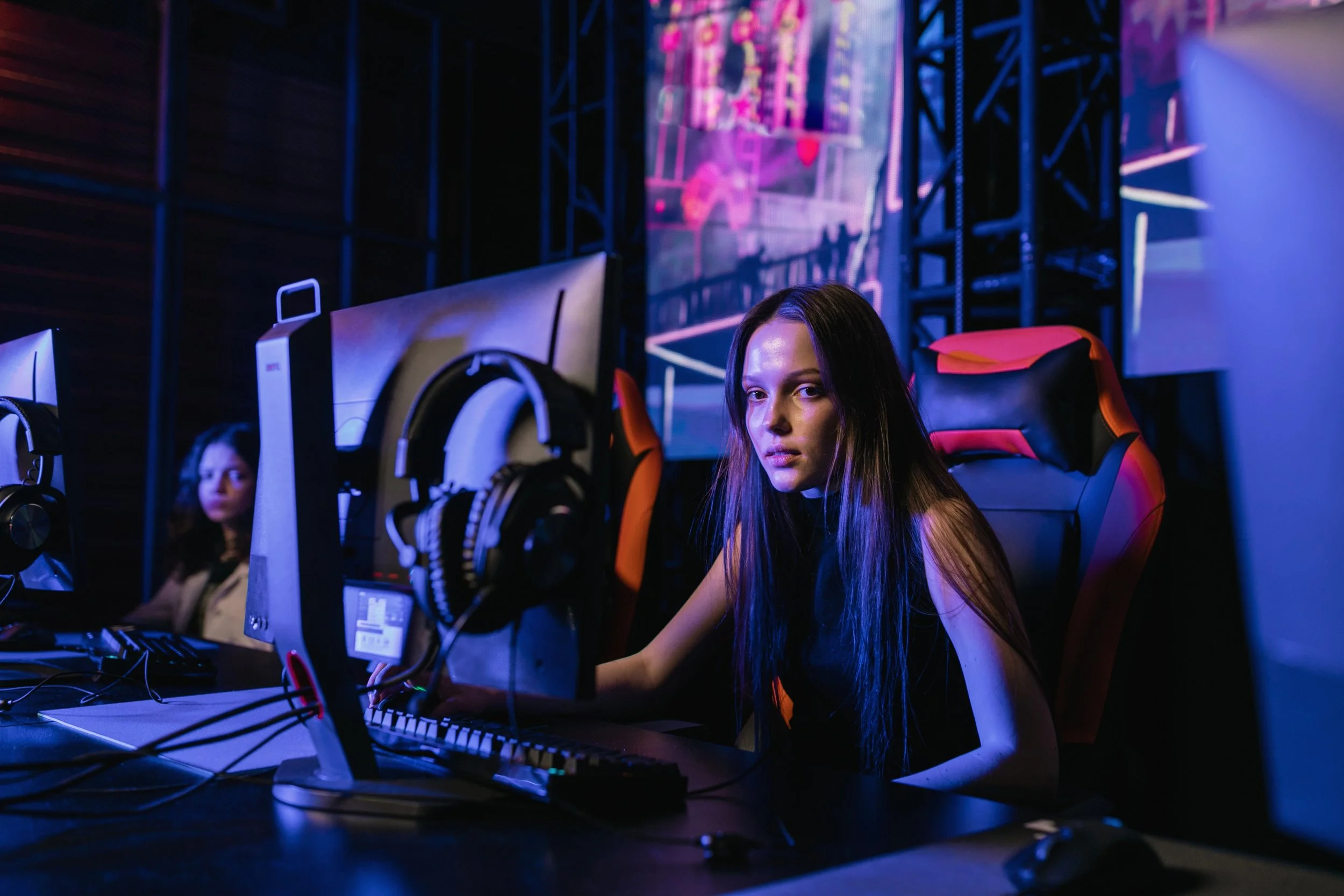By Kathryn Lee (she/her)
Content warning: discussions of harassment, bullying, and sexist slurs, mentions of rape threats and death threats
(Icon image 1) (Natalia, Lyncconf)
Online gaming should be an enjoyable and inclusive experience, free from harassment and toxicity. It’s not only women who face bigotry and hostility in the online gaming community, LGBTQIA+ people and people of colour are also affected. I've faced online harassment in the past while streaming on platforms like Twitch. Streaming games used to be a mixed experience for me, filled with both great moments and some truly horrible ones. However, my negative experiences led me to step away from streaming.
In one survey of online gamers, 79.0% of participants reported that sexism is prevalent within the online gaming community and 63.3% of women reported being harassed while playing online video games. (Bustos-Ortega, 2023)
I also had to deal with trolling, threats, and online harassment, which I found emotionally draining.
(Image 2) (Krukau) Two women with playing with gaming controllers
Examples of Online Harassment Towards Women
There are various forms of online harassment:
Sexist comments
Threats, including threats to harm, rape, and/or kill
Doxing (releasing someone’s personal information online, such as address)
Cyberstalking
Journalist and video game writer, Alanah Pearce, shared her experience as she says “They would send me rape threats; on Facebook, they said I will rape you if I ever saw you in person. It was a young boy who said this to me. I reached out to his mother on Facebook. His mother made her son write a letter of apology. I doubt he will ever do that again”. (BBC Three, 2016)
In the BBC video called The Dark Side Of Gaming - The Females Fighting Back an anonymous male gamer’s voice yells, “Get back in the kitchen and get your hands off the video game controller, stupid bitch” at a woman while she is gaming. (BBC Three, 2016) Female streamers such as Pokimane and Kyedae frequently make compilation videos of the harassment they face online which feature similar sexist remarks.
I have faced this misogynistic insult many times. It’s a stereotype that women don't belong in the gaming world and instead should be making food in the kitchen. The people who say this feel superior to women, don’t have a social life or do not “touch grass'' (go outside). Bigotry becomes a learned behaviour, mimicked by those seeking social inclusion in online spaces. They potentially lack real-life interaction with women, making it easier for them to see women as sub-human.
(Image 3) (Psychology, Social Psychology, Aggression)
Root Causes of Online Harassment
One of the root causes of online harassment is having little to no consequences for their poor behaviour online. The gamers who harass others online have anonymity as they don't have to show their real identity or face. There are not enough gaming platforms that invest in reviewing complaints and banning offending behaviour. Online gaming is a competitive environment that includes trash talking and gamers taking the game too seriously. The gaming community has young boys who sometimes lack maturity or fail to understand that online behaviour can cause real-world harm.
Additionally, toxic gaming culture encourages discrimination, harassment, and bullying. In a TedTalk video, Lilian Chen shares her experience as a woman who used to be part of the gaming community. Lilian says, “As a woman, I was sexist and misogynistic against my own gender” (TED Archive, 2017).
It’s not only men who do online harassment, women do it too… The “pick me girl” would usually assert dominance against other women players in the online gaming community for the purpose of gaining male attention and validation. I personally have been toxic towards gamers who have been toxic to me, but I’ve learned there is no point engaging in the same bad behaviour. I find it better to ignore the nonsense to keep myself at peace.
Learn more about the “pick me girl” phenomenon in the blog post: Why You Should Skip The “I’m Not Like Other Girls” Phase
(Image 4) (RDNE Stock Project)
Consequences of Harassment in Gaming
Those who experience cyberbullying from games can experience depression, isolation and anger due to the toxicity. Women play games for their enjoyment and to make friends but many experience isolation as they avoid interaction to minimise experiencing harassment while gaming.
It's important to address this issue because online harassment has become disturbingly normalised within the gaming community. The resulting negative environment has affected all gamers. A 2021 survey found that 61% of game developers were men, 30% were women, and 8% were gender diverse. (J. Clement, 2023).
This demonstrates the gender gap in the gaming industry. Harassment turns women away from gaming and the gaming industry creating a vicious cycle of under-representation, which in turn allows misogyny to go unchecked. Greater representation of women employed in the gaming industry is necessary to build a safe environment for female players. Some gaming companies, such as Riot Games, have taken steps to combat online harassment. They have implemented systems in games like Valorant to discourage toxic behaviour by banning offending accounts and allowing users to mute and report offending players.
Strategies to Combat Toxicity
Here are some coping strategies you can use when you experience online harassment when gaming:
Use the reporting system in the game
Join a supportive community in discord or reddit and make friends online
Promote respectful and inclusive gaming culture following community guidelines, inclusive language and engage in the gaming community
Advocate for industry wide changes and policies by supporting reforms and signing petitions on change.org calling for improved data privacy regulations to prevent doxing, more comprehensive enforcement of player conduct guidelines, and increased diversity of in-game characters.
Calling out bigoted behaviour and standing up for others where safe to do so
In the Ted Talk video, Lilian Chen says “My experience showed me that my silence only further enabled sexism within gaming. It will make people reevaluate their harmful actions.” (TED Archive, 2017)
Being vocal about your gaming experience can help other gamers to be more self-aware of their harmful behaviour. It also allows them to share their own experiences in the gaming community. Staying quiet can enable more sexism in online gaming.
(Image 5) (Alena Darmel)
In conclusion, the online gaming community has seen a significant increase in the number of women participating. However, there's a concerning trend of harmful behaviour, such as online harassment, doxing, and discrimination, which negatively affects all gamers. It's important for the gaming community to be a safe and inclusive space for everyone. We have the power to make a change. It's important to remember that many women worldwide have faced online harassment, and you're not alone in this experience. By speaking out against misogynistic behaviour in games and reporting it, we can work towards a safer, more supportive, and more enjoyable gaming community.
Resources for support:
Sources:
BBC Three. (2016, February 17). The Dark Side Of Gaming - The Females Fighting Back | EXCLUSIVE [Video]. YouTube. https://www.youtube.com/watch?v=tZMjGwjCAuQ
Bustos-Ortega, M., Carretero-Dios, H., Megías, J. L., & Romero-Sánchez, M. (2023). Sexist Attitudes in Online Video Gaming: Development and Validation of the Sexism Against Women Gamers Scale in Spanish and English. Psychology of Women Quarterly, 47(3), 320–342. https://doi.org/10.1177/03616843231162837
Darmel, A. (2021, May 12). A Man and Woman Sitting on a Gaming Chair while Playing Video Games · Free Stock Photo. Pexels. https://www.pexels.com/photo/woman-using-a-computer-7862503/
Designed and Developed by Will Earp, South West Grid for Learning Trust Ltd. (n.d.). Is the Gaming Industry Doing Enough for its Female Players? | SWGfL. https://swgfl.org.uk/topics/gaming/is-the-gaming-industry-doing-enough-for-its-female-players/
Games, L. (n.d.). Professional Girl Gamer Plays in MMORPG/ Strategy Video Game on Her Computer. - Credit to https://www.lyncconf.com/. Flickr. https://www.flickr.com/photos/nodstrum/28449547057
Gender Stereotypes and Discrimination in Gaming. (2022, September 15). INTENTA. https://intenta.digital/perspectives/gaming-gender-stereotypes-discrimination/
Gitnux. (2023). The Most Surprising Female Gamers Statistics And Trends in 2023 • GITNUX. GITNUX. https://blog.gitnux.com/female-gamers-statistics/
Krukau, Y. (2021, August 5). Two Women Playing Video Games while Sitting on the Sofa · Free Stock Photo. Pexels. https://www.pexels.com/photo/two-women-playing-video-games-while-sitting-on-the-sofa-9068936/
Lcsw, A. F. (2022, December 8). Women in Gaming: A Difficult Intersection. Psychology Today. https://www.psychologytoday.com/us/blog/video-game-health/202201/women-in-gaming-difficult-intersection
McDaniel, M. A. (n.d.). Women in Gaming: A Study of Female Players’ Experiences in Online FPS Games. The Aquila Digital Community. https://aquila.usm.edu/honors_theses/427/
Natalia. (2023, September 14). LyncConf - Immerse in Gaming, Explore Gaming Equipment, and Navigate the World of Technology. LyncConf. https://lyncconf.com/
Project, R. S. (2021, May 16). A Woman Playing Video Game · Free Stock Photo. Pexels. https://www.pexels.com/photo/a-woman-playing-video-game-7915492/
Psychology, Social Psychology, Aggression. (n.d.). OERTX. https://oertx.highered.texas.gov/courseware/lesson/2153/student/?section=8
TED Archive. (2017, July 20). Calling out misogyny in the gaming world | Lilian Chen [Video]. YouTube. https://www.youtube.com/watch?v=dppbPWVbuTs






